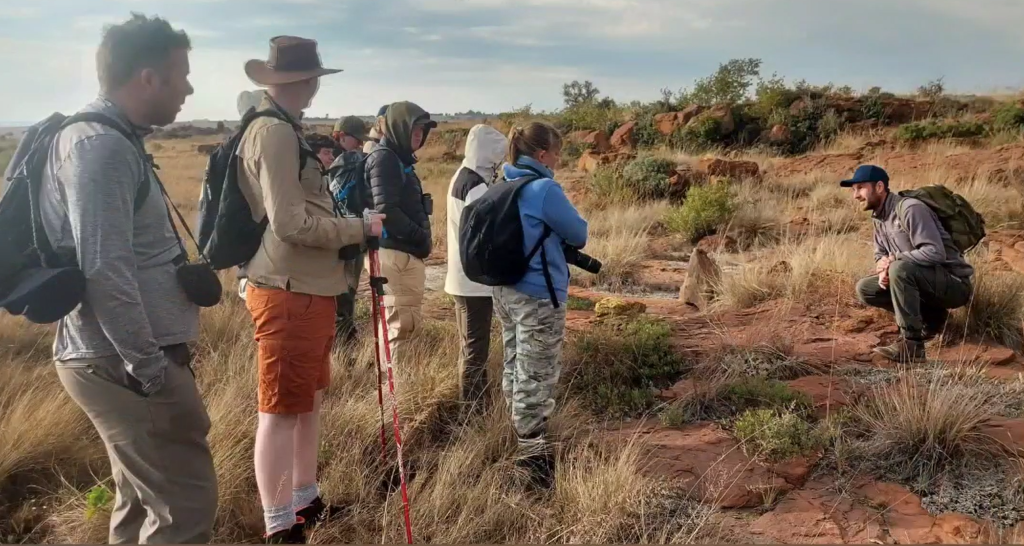Posted: 30 September 2025

A group of 17 Animal Welfare Science students from University Campus Doncaster and University Campus North Lincolnshire recently returned from an unforgettable field trip to South Africa with African Insight Academy, an experience that combined academic learning, hands-on conservation work and powerful encounters with some of the world’s most iconic wildlife.
After arriving in Johannesburg, the students hit the ground running, exploring three distinct ecological regions, each offering a unique insight into conservation science in action across the 12-day trip. From rewilding landscapes and freshwater monitoring to up-close encounters with endangered species, the trip delivered both professional inspiration and personal growth. Through hands-on experiential learning, the students gained invaluable insights into the complexities of conservation and the importance of protecting our planet’s precious wildlife and ecosystems.
Ezemvelo Nature Reserve: Where rewilding meets reality
The journey began at Ezemvelo Nature Reserve, a dramatic, rocky landscape undergoing an ambitious rewilding project. Formerly used for agriculture, the area is now being carefully restored to its natural state, with wildlife reintroductions playing a central role.
Students actively contributed to this conservation effort, taking part in ecological surveys, identifying animal tracks and signs, and studying native plant and rock formations. They also helped assess the health of freshwater ecosystems using the mini Stream Assessment Scoring System (miniSASS), a valuable tool for measuring water quality based on aquatic life.
Regular game drives gave students the opportunity to observe wildlife in their natural habitats, including giraffes, zebras, antelope, and a wide variety of birds, bringing textbook theories vividly to life.
Pongola Game Reserve: Ecology in motion
At the next stop, the students journeyed to White Elephant Safaris on Pongola Game Reserve, Zululand, students were diving into the South African Conservation Success Story and differing reserve management styles. Students gained hands-on skills in telemetry tracking, biodiversity surveys, game counts and wildlife monitoring.
The setting provided a peaceful yet powerful moment to reflect on the beauty and complexity of the ecosystems they were studying. A scenic boat safari offered a new perspective on Jozini Lake, and students observed hippos, crocodiles, terrapins, monitor lizards and numerous bird species in their natural wetland environment.
Students also had the incredible opportunity to visit the heart of Candover Community and immerse themselves in the vibrant culture of village life. They were honoured to visit the local traditional healer and spend time at the community creche.
This very immersive and experiential learning part of the trip was concluded by reviewing footage from motion-triggered camera traps that the students had placed on their arrival at carefully selected sites. This added an exciting dimension and a hint of competition to see which group could capture candid glimpses of local wildlife in action. These images provide valuable data for conservation monitoring and a few exciting surprises.
Hluhluwe–iMfolozi Park: Conservation in action
The final stage of the journey brought students to the historic Hluhluwe–iMfolozi Park, renowned for its pioneering work in rhino conservation. Here, students had the rare and moving opportunity to visit a rehabilitation centre for orphaned white rhinos and to witness a wild black rhino under veterinary protection as it recovered from injuries sustained from rival rhinos.
These encounters were a powerful reminder of the common threats facing wildlife, as well as the impact that dedicated conservation efforts can have. They also highlighted the ethical and practical complexities that animal welfare professionals face in the field.
Across the entire trip, the students recorded a remarkable 88 bird species, 29 mammals, and nearly 20 reptiles, amphibians, and invertebrates, from birds of prey and vibrant lizards to nocturnal mammals and the elusive leopard tortoise.
An Experience with lasting impact
Beyond the wildlife sightings and fieldwork, the trip offered students a deeper understanding of ecological systems, animal welfare challenges, and the role of science in shaping conservation policy. Many returned with renewed motivation to pursue careers in wildlife protection, research and advocacy.
Programme Leader for both the FdSc Animal Welfare Science and BSc Applied Animal Welfare Science Top-Up degrees, Hayley Hudson, summed up the experience:
“Seeing our students out in the field, getting hands-on with conservation work and encountering incredible wildlife truly brings their studies to life. This now annual trip to South Africa offers them learning opportunities no classroom can match and ignites a genuine passion for protecting animals and their habitats. It’s been inspiring to watch how this experience has motivated this years group as they prepare for their future careers.”
As students return to academic life or prepare to graduate this autumn and step into their future careers, their experiences in South Africa will continue to shape their perspectives, studies, and aspirations. For many, the trip sparked a deeper commitment to animal welfare and conservation, strengthening their determination to build meaningful careers dedicated to protecting animals and the environments they call home.
Animal Welfare Science Lecturer and trip organiser Julie Sillence added, “What an adventure! This trip wasn’t just about learning; it was about diving headfirst into new experiences, meeting incredible animals, and soaking up the local culture. The students couldn’t stop smiling, and the excitement from both them and our inspiring guides was contagious. Honestly, I’m already counting down the days until we do it all again.”
Applications for next year’s international field trip will in the new academic year, and for Animal Welfare students looking to turn their passion for animals into a meaningful impact, this is a journey not to be missed.